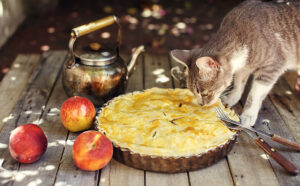5 Thanksgiving Foods That Are Toxic to Cats
November 5th, 2021

Thanksgiving is a wonderful time for humans, as they gather with family and friends to enjoy their holiday traditions. Unfortunately, it can be quite a hazardous time for your feline friend. With potentially toxic foods easily accessible, more and more cats end up requiring emergency care each year. Here’s what you need to know about foods to avoid so that you and your kitty have a safe and happy Thanksgiving.
Thanksgiving Foods That Are Toxic to Cats
Here are five Thanksgiving foods that are toxic to your feline friend:
#1 Stuffing: Stuffing is a staple Thanksgiving side. However, the savory dish often contains onions, scallions, and garlic, all of which are extremely toxic to cats. They damage the membranes of the red blood cells, often leading to life-threatening anemia, a condition characterized by a low red blood cell count.
#2 Raisins and Grapes: Raisins and grapes are ingredients often found in stuffing or Thanksgiving salads. Veterinarians aren’t quite sure why, but even the tiniest amounts are highly toxic, potentially leading to vomiting and diarrhea before shutting the kidney down.
#3 Turkey Bones: Ingesting turkey bones can cause severe indigestion, vomiting, and even bowel obstruction. Worse yet, the bones may splinter and cause devastating damage to the inside of the stomach and intestines. A puncture through the stomach can sometimes cause a potentially fatal abdominal infection.
#4 Uncooked Bread Dough: Everyone loves the smell of freshly-baked Thanksgiving rolls. However, make sure to keep the uncooked dough out of reach. If ingested, it can lead to bloating. As it breaks down in your feline friend’s digestive tract, fermenting yeast converts the sugars in the dough to carbon dioxide and alcohol, leading to alcohol poisoning, which is a potentially life-threatening emergency.
#5 Xylitol: This artificial sweetener is often used in baking Thanksgiving treats. However, xylitol is highly toxic to all pets. It can elicit a sudden insulin release, resulting in your furry friend’s blood sugar dropping, a condition known as hypoglycemia. Unfortunately, many xylitol exposure survivors end up with liver damage and even liver failure.
What Thanksgiving Treats Can You Give Your Cat?
While it’s always best to stick to cat food, as long as your cat is not allergic or prone to diarrhea with dietary changes, a small amount of turkey is healthy and won’t hurt your feline friend. You don’t have to leave your furry friend out!
Quality Veterinary Care in Kirkland, WA
We, at All About Cats Veterinary Hospital, hope that you have a wonderfully safe and happy Thanksgiving. Make sure you keep foods that can harm your furry companions out of reach. If, however, your cat ingests a toxic Thanksgiving treat, don’t wait! Contact us immediately for evaluation and emergency care. You can also contact the ASPCA National Animal Poison Control Center for information.
Recent Posts
-
Summer Safety Tips for Cat Owners
July 11th, 2024
-
The ABCs of Cat Vaccinations – What Every Cat Owner Should Know
June 5th, 2024
-
Preparing for Travel With or Without Your Feline Friend
May 3rd, 2024
-
How to Feed Cats in a Multiple-Cat Household
April 8th, 2024
-
8 Tips to Get Your Cat in a Carrier
March 5th, 2024
-
Help, My Cat’s Breath Smells!
February 5th, 2024
-
A Quick Guide to Coping with Cat Emergencies
January 8th, 2024
-
Traveling for the Holidays? 6 Things to Do Before Leaving Your Cat
December 14th, 2023
-
What Is Catnip and Is It Safe for Your Cat?
November 2nd, 2023
-
5 Tips for New Cat Owners
October 5th, 2023
-
How Often Should My Cat Have a Health Check?
September 7th, 2023
-
Cat Hairballs – What Do I Need to Know?
August 4th, 2023
-
How to Play with Your Cat: Fun Cat Activities
July 4th, 2023
-
What to Know About Your Cat’s Surgery
June 10th, 2023
-
Licensed Veterinary Technician or Technician Assistant Wanted (Full time or Part time)
May 15th, 2023
-
Why, Oh Why, Does My Cat Hate Water?
May 9th, 2023
-
What’s Wrong with My Cat? Benefits of Whole-Body Radiology
April 5th, 2023
-
Should I Feed My Cat a Grain-Free Diet?
March 6th, 2023
-
Smelly Cat, Smelly Cat – Causes of Feline Odors
February 22nd, 2023
-
5 Ways to Reduce Cat Shedding
January 3rd, 2023
-
Your Cat’s Holiday Stress – How to Help
December 6th, 2022
-
Pet Cancer Awareness Month: Warning Signs to Look Out For
November 2nd, 2022
-
10 Halloween Safety Tips for Cat Owners
October 3rd, 2022
-
Why Is My Cat So Active at Night?
September 7th, 2022
-
Should I Really Microchip My Cat?
August 9th, 2022
-
Ways to Keep Your Cat Safe and Cool This Summer
July 1st, 2022
-
10 Fascinating Facts About Persian Cats
June 1st, 2022
-
How to Correctly Transition Cat Foods
May 6th, 2022
-
What Your Cat’s Tail Is Secretly Trying to Tell You
April 5th, 2022
-
6 Common Household Items That Are Poisonous to Cats
March 1st, 2022
-
How Do I Know if My Cat Needs Dental Surgery?
February 16th, 2022
-
How to Safely Introduce Your Cat to Your New Baby
January 11th, 2022
-
Giving a Cat as a Christmas Gift: How to Do It Responsibly
December 6th, 2021
-
5 Thanksgiving Foods That Are Toxic to Cats
November 5th, 2021
-
Is My Kitty Depressed? Signs to Look For in a Sad Cat
October 7th, 2021
-
Training Tips for New Kitten Owners
September 7th, 2021
-
Taking Your Cat to the Vet: How to Make It a Stress-Free Experience
August 6th, 2021
-
The Origins and History of the Tabby Cat
July 13th, 2021
-
We are hiring a Veterinary Technician!
July 12th, 2021
-
Kitty Claw Control: How and When to Cut Your Cat’s Nails
June 7th, 2021














